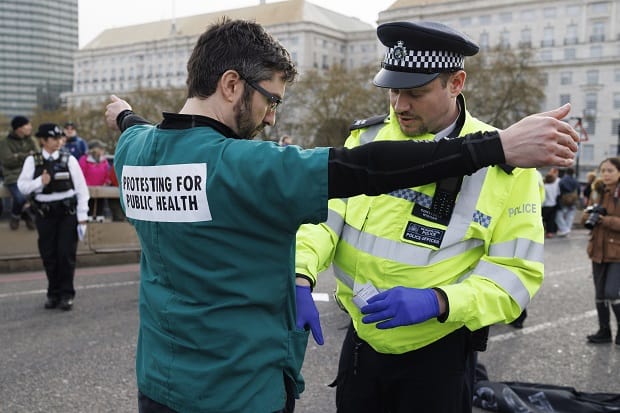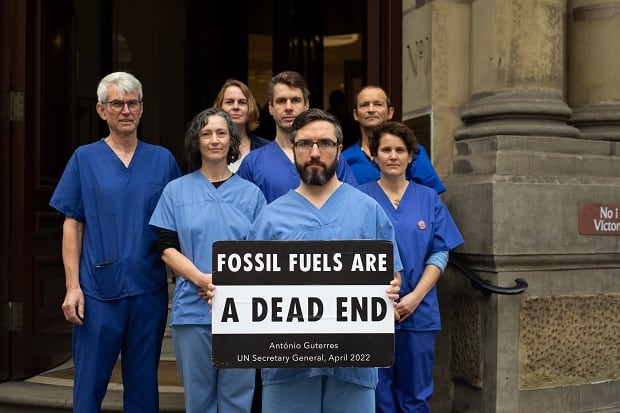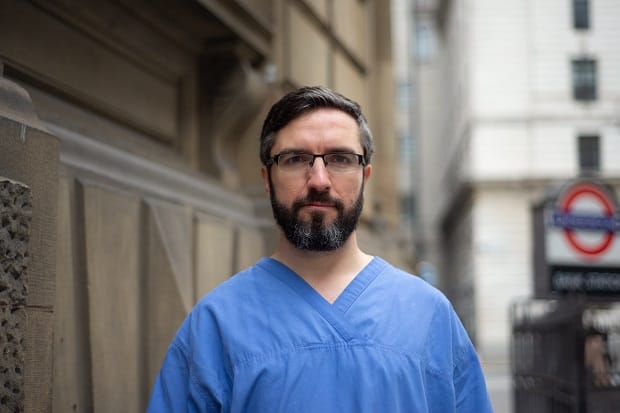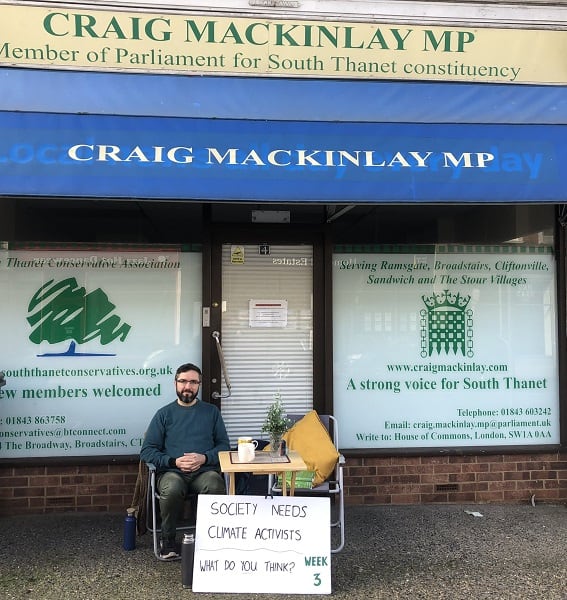
A GP from Margate is among seven health professionals who have been acquitted at City of London magistrates’ court following a climate change protest.
Dr Chris Newman is the founder of campaign group Doctors for XR with the aim of bringing the climate change issue into the public eye.
The 41-year-old says he wants to open up the conversation and believes “public messaging on climate change is vital for us to avert the catastrophic harms that are looming.”
The Doctors for XR group – comprised of Dr David McKelvey, Dr Chris Newman, Dr Mark Russell and Dr Patrick Hart – all GPs – Dr Alice Clack, a hospital consultant obstetrician, Dr Rosie Jones, a clinical psychologist and Anna Bunten, a specialist nurse – faced a charge of ‘breach of section 14’ of the public order act.
They had been part of a group of approximately 20 health professionals who blocked Lambeth bridge in April, displaying a banner saying ‘For Health’s Sake. Stop Financing Fossil Fuels.’ The action was to highlight the estimated £10 billion in annual financial support the government gives to the fossil fuel industry.

The action resulted in the seven being arrested. Section 14 is a police power that allows them to set conditions on a “public assembly”, if they believe it may cause a serious public disorder, serious damage to property or serious disruption to the life of the community.
The court didn’t agree with the charge and the seven were acquitted at a hearing earlier this week.
Dr Newman, who moved from London to Margate 18 months ago, initially started a podcast about plastic pollution in 2018 but was then persuaded to look at wider climate change.
He said: “Then all the XR stuff kicked off in London and the fact these people were willing to do this confrontational protest and potentially sacrifice their freedom made me look into it more.
“I was one of those trusting the government to fix it but realised it wasn’t happening and was just a can being kicked down the road.”
Dr Newman, who does not have a car and no longer uses air flights, says it was this that inspired him to create Doctors for XR and et health professionals on board to ‘legitimise’ the cause.
The group has around 1,000 members, a few hundred of which are actively involved in demonstrations.

He said: “We need serious changes to society. People will obviously be sceptical. But the science is there from doctors and medical institutions like the BMA and RCN.”
The concern is that climate change alters the quality of the air we breathe, the water we have access to, and the food we can produce.
Rapidly changing environmental conditions also alter our exposures to infectious diseases and natural hazards such as heat waves, droughts, floods, fires, and tropical storms. Dr Newman and other health professionals say this ultimately affects our health and wellbeing, including nutritional outcomes, infectious disease, non-¬communicable disease, displacement and conflict, and mental health outcomes.

Dr Newman likens the effects to a person with high blood pressure, the lack of symptoms mean this is a ‘silent killer,’ saying: “It is the reason a doctor will check your blood pressure and treat before the symptoms become obvious and stop you having a heart attack or a stroke.
“With climate change the message is that the health impacts come from increasing intensity of natural disasters like floods and fires, not just changing heat but also rainfall and this is significant for where we grow our crops and that is likely to have to change many times.
“There will be changes to food growing, rising sea levels making coastal regions more difficult to live in putting pressure on middle regions. There will be changes to diseases and future pandemics.
“People with no option but to leave their homes and head to cities means there will be tensions and conflicts. Humans have never adapted to changing climate before.”

Dr Newman says he believes MPs and government should lead the message about climate change, or at least be actively involved, but says that isn’t happening.
As part of his efforts to get people talking Dr Newman has been sitting outside MP Craig Mackinlay’s Broadstairs office every Sunday with a sign, thermos and chairs inviting people to talk to him and share their views on climate change.
He said: ”I started sitting in front of Craig Mackinlay’s office with the sign because I believe public messaging on climate change is vital for us to avert the catastrophic harms that are looming. During covid there were signs everywhere – at the bus stop, at the GP surgery, in the street – we need that for climate, to get everyone on board, and help inspire our collective wisdom to fix the problem.
“However that isn’t happening. The only engagement most people have with this issue are news reports/articles. And the people making the stories are climate activists. Without them it would barely be in the press. There would be a lot less interest, and a lot less action – from government, corporations and civil society.
“I want to support these activists but also start a local messaging campaign. I believe there is something about being on my own that makes me less threatening than a group.
“I also want to talk with people in Thanet about climate change, as an antidote to media outlets which often polarise. To have the debate. And if people don’t like activists, which most don’t, to gently challenge them on that.
“I thought the best thing to do was just start, sit with a sign, a thermos, teabags and cups and invite people to come and talk. And given how behind on the climate science Craig Mackinlay MP seems to be, his office in Broadstairs seemed the best place to start. It’s not a busy street but the location is symbolic.”
Dr Newman hopes other health professionals around the country will follow his lead, and his #Sundaysforscience hashtag, and get people in their areas talking about climate change.
In a typically medical analogy about the need for action, he says: “Protest is like attempting to shock a failing heart, in the hope it will change its rhythm.”

